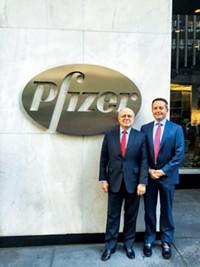Advertisement
Grab your lab coat. Let's get started
Welcome!
Welcome!
Create an account below to get 6 C&EN articles per month, receive newsletters and more - all free.
It seems this is your first time logging in online. Please enter the following information to continue.
As an ACS member you automatically get access to this site. All we need is few more details to create your reading experience.
Not you? Sign in with a different account.
Not you? Sign in with a different account.
ERROR 1
ERROR 1
ERROR 2
ERROR 2
ERROR 2
ERROR 2
ERROR 2
Password and Confirm password must match.
If you have an ACS member number, please enter it here so we can link this account to your membership. (optional)
ERROR 2
ACS values your privacy. By submitting your information, you are gaining access to C&EN and subscribing to our weekly newsletter. We use the information you provide to make your reading experience better, and we will never sell your data to third party members.
Business
AbbVie And Shire Agree On Merger
Acquisition: Combination of U.S. and Irish firms will create new U.K.-based pharma company
by Ann M. Thayer
July 18, 2014
After pursuing the specialty pharmaceutical firm Shire for months, Illinois-based AbbVie has finally convinced it to merge. AbbVie will pay about $54 billion in cash and stock to the Irish firm’s shareholders, who will end up with a 25% ownership stake in the new company.
“We believe that this offer reflects the substantial value that we have already created for Shire’s shareholders and the strength of our future prospects,” said Susan Kilsby, chair of Shire’s board, on announcing its support of the deal. The offer represents a 53% premium to Shire’s stock price in early May, when AbbVie first proposed a merger. It’s also about 35% higher than AbbVie’s original offer.
AbbVie has long argued that Shire’s products could be better marketed by its larger organization. Major areas for the combined firm will include immunology, rare diseases, neuroscience, metabolic diseases, hepatitis C, and oncology.
But AbbVie needs a lift as well. Although its annual sales are four times that of Shire’s, 57% of its $19 billion in 2013 revenues came from the anti-inflammatory drug Humira, which loses patent protection in 2016.
Along with product diversification, the merger will allow AbbVie to set up new headquarters in the U.K. and lower its tax rate to about 13% from 22%.
Indeed, AbbVie is the latest of many U.S. companies to pursue such tax inversions, quickly generating strongly negative reaction from lawmakers. In May, legislators introduced bills in Congress after Pfizer attempted and failed to acquire London-based AstraZeneca. And last week, U.S. Treasury Department Secretary Jacob J. Lew asked leaders in the House of Representatives and the Senate to ban inversions, retroactive to May.
For now, partisan politics may keep anything from happening. “We maintain our view that inversions legislation will not happen in 2014,” says Terry Haines, senior political strategist at the investment research firm ISI Group. He anticipates that comprehensive tax reform in 2015 will lower corporate tax rates and move the U.S. toward a “friendlier and more competitive tax system.”
Boards of both companies have approved the deal, which now awaits shareholder approval. If approved, the merger will happen in the fourth quarter of 2014.



Join the conversation
Contact the reporter
Submit a Letter to the Editor for publication
Engage with us on Twitter